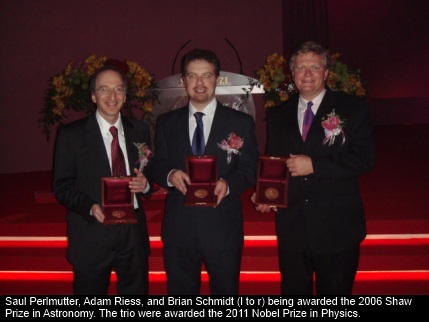|
News & Views item - October 2011 |
![]() Australia's Alaskan Born, Harvard Trained 2011 Physics Nobel
Laureate Speaks Out. (October 12, 2011)
Australia's Alaskan Born, Harvard Trained 2011 Physics Nobel
Laureate Speaks Out. (October 12, 2011)
The Australian's Julie Hare went to interview Brain Schmidt -- who chose to make Australia his home in the mid-1990's -- and got some straight talk:
 THEY
say in politics that education and science don't win elections, but they are
what make nations rise and fall. They are the engine behind Western
civilisation... When I first came to Australia 15 years ago, it was a well-off
nation that was isolated by oceans from the rest of the world. Now we find
ourselves a very wealthy nation in the middle of Asia, the place where the
world's economy is booming. We have to take this opportunity, which is really as
good as Australia has ever had it, and ensure we get a lasting legacy for the
next century.
THEY
say in politics that education and science don't win elections, but they are
what make nations rise and fall. They are the engine behind Western
civilisation... When I first came to Australia 15 years ago, it was a well-off
nation that was isolated by oceans from the rest of the world. Now we find
ourselves a very wealthy nation in the middle of Asia, the place where the
world's economy is booming. We have to take this opportunity, which is really as
good as Australia has ever had it, and ensure we get a lasting legacy for the
next century.
[But that legacy will come only if] we make our citizens the best educated in the world and from that, from strategic planning, use those people to progress science and technology. Getting our wealth by digging it out of the ground is fine in the short term, but we need to add value and create things that we and the rest of the world want to use. We have a great platform: we are in the right place geographically, we have the resources to do it and it's a matter of putting together a long-term plan of how to do it. It might take a very long time to sort out, but it needs to be done.
Professor Schmidt doesn't acknowledge any conflict between fundamental and applied research.
Knowledge is not just about going from A to B. When you know where you are going you never invent anything new, just improve on things. Basic knowledge is the basis behind revolutions, changing fundamentally the way humanity moves forward.
Then turning to the matter of education he told Ms Hare that as a teenager in Alaska he was blessed with high-quality science teachers, many of whom held PhDs. But he said the quality of teaching across Australia was sketchy at best.
My children have had great teachers, but that might be because there are a lot of scientists in the ACT. I know that story is not the same in other parts of Australia. It's a matter of connecting the interesting nature of our lives and the quality of our lives to kids; making sure we get science well taught throughout the curriculum. If it's attractive, people will do it.
Is there a likelihood of our major political parties joining to develop bipartisan initiatives to bypass Brian Schmidt's noting, "They say in politics that education and science don't win elections"?
According to our first Physics Nobel Laureate since 1915 it's a matter of putting together a long-term plan of how to do it. It might take a very long time to sort out, but it needs to be done.